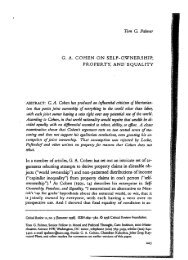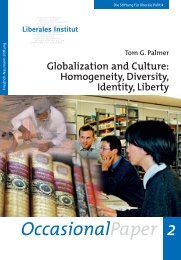Are Patents and Copyrights Morally Justified? - Tom G. Palmer
Are Patents and Copyrights Morally Justified? - Tom G. Palmer
Are Patents and Copyrights Morally Justified? - Tom G. Palmer
You also want an ePaper? Increase the reach of your titles
YUMPU automatically turns print PDFs into web optimized ePapers that Google loves.
1-laroarajournal oj Law C5 ruouc rotwy iv us. su<br />
Rather than offering a survey ofsome of the more outré results<br />
of this law, I will present instead a brief statement of its theoretical<br />
grounding.<br />
Such rights entered the law (in France, at least, the place<br />
where they have received the greatest legal recognition) in<br />
court decisions governing the division of artistic property. In a<br />
1902 case before the highest French court, the Court of Cassadon,<br />
the court had to consider whether the ex-wife ofan artist<br />
had the right to share in the commercial exploits of her husb<strong>and</strong>’s<br />
work.’°’The court ruled that she had a right to a share<br />
ofthe economic proceeds, but that this decision would not “detract<br />
from the right ofthe author, inherent in his personality, of<br />
later modifying his creation, or even suppressing it” 102<br />
JosefKohler, author ofan influential treatise on law, argued:<br />
“Personality must be permitted to be active, that is to say, to<br />
bring its will to bear<strong>and</strong> reveal its significance to the world; for<br />
culture can thrive only if persons are able to express themselves,<br />
<strong>and</strong> arein a position to place all their inherent capacities<br />
at the comm<strong>and</strong> of their will.” 03 So far, this sounds familiar.<br />
But, Kohier argued further:<br />
[T]he writer can not only dem<strong>and</strong> that no strange work be<br />
presented as his, but that his own work not be presented in a<br />
changed form. The author can make this dem<strong>and</strong> even when<br />
he has given up his copyright. This dem<strong>and</strong> is not so much<br />
an exerciseofdominion over my own work, as it is of dominion<br />
over my being, over my personality which thus gives me<br />
the right to dem<strong>and</strong> that no one shall share in m~ 5 personality<br />
<strong>and</strong> have me say things which I have not said.’<br />
Damage to a work of art, even after ownership rights to it<br />
have been transferred to another party, constitutes damage to<br />
the personality of the creator; the work of art is an extension of<br />
the personality ofthe creator. Thus, according to Kohier, issuing<br />
an unauthorized, or bowdlerized, edition of an author’s work,<br />
hanging red ribbons on a sculpture, or tearing down a piece of<br />
sculpture even so offensively ugly as Richard Serra’s “Tilted<br />
101. Cinquin v. Lecocq, Req. Sirey, 1900.2.121, note Saleilles (1902) (cited in S.<br />
STROMHOLM, I La Daon~MORAL DE L’AUTEUR 285 (1966)).<br />
102. S. STROMHOLM, supra note 101. at 285.<br />
108. J. KOHLER, PHILOSOPHY OF Law 80 (G. Albrecht trans. 1914).<br />
104. J. KOHLER, URHEBERRECET AN SCHRWFWERKEN UND VERLAGSRECHT 15 (1907)<br />
(quoted in Damich, .supra note 100, at 29); see also Katz, The Doctrine ofMoral Right <strong>and</strong><br />
American Copyright Law—A Proposal, 24 S. C~u..L. REV. 402 (1951).











